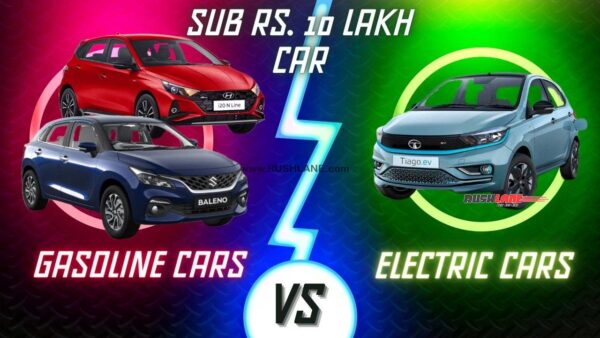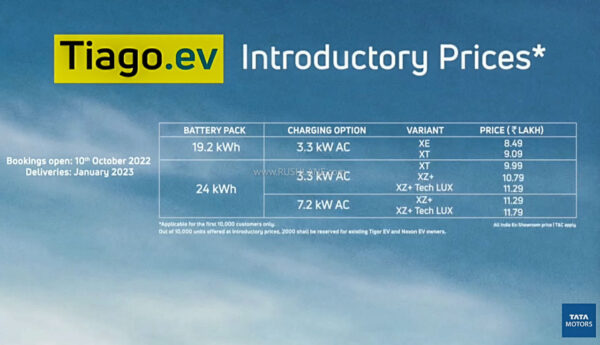When looked at a distance of 1,00,000 km, EVs come out to be significantly economical even before no-maintenance advantages kick in

Tata has pulled off quite a feat when it comes to 2023 Tiago EV. At Rs. 8.5 lakh (ex-sh), Tiago EV is likely to be the torch bearer for affordable EVs to follow in the future. As far as competition is concerned, Tiago EV is unrivaled. Until the Citroen C3 electric makes its appearance known.
Mahindra has set its interests in electric SUVs with its EV portfolio starting from XUV400. MG is the only other possible entrant in the near future in this affordable EV space after Citroen. We have seen Air EV test mules on Indian soil too. However, it begs the question of how economical 2023 Tiago EV can be over petrol-powered hatchbacks like i20 and Baleno? With a Rs. 10 lakh budget, should you buy a Tiago EV? Or should you just buy a Baleno or an i20 instead? Let’s take a closer look.
2023 Tiago EV
For starters, Tiago EV’s Rs. 8.5 lakh sticker price is introductory and is for base XE trim and goes till 11.79 lakh for XZ Plus Tech LUX Long Range Fast Charger. While Baleno starts from Rs. 6.42 lakh and goes till Rs. 9.60 lakh. i20 steers towards the pricey end of hatchback spectrum with prices starting from Rs. 7.07 lakh and goes till Rs. 11.62 lakh (all prices ex-sh).
But for the sake of this comparo, we are taking automatic variants only as Tiago EV is also an automatic. Fair game! Right from the get-go, 2023 Tiago EV saves bucks as it is not subjected to RTO taxes. While the other two are. In effect, Tiago EV on-road pricing starts at around Rs. 9 lakh, Baleno’s cheapest automatic variant around Rs. 9.4 lakh and i20’s cheapest automatic is around Rs. 10.7 lakh.

Also, Tiago EV borrows 4-star crash safety from petrol Tiago, i20 gets a 3-star crash safety while Baleno is still not tested. Previous generation Baleno scored 0-star crash rating when tested by Latin NCAP. Disclaimer: On-road prices are for Karnataka state, which has among the highest RTO taxes in the country.
Economy of EV vs Gasoline
2023 Tata Tiago EV is offered in two battery pack options. A 19.2 kWh pack and a larger 24 kWh pack. Also, i20 is offered with a diesel option. To keep the comparo sportive, we will take a medium range Tiago EV and only petrol i20 which fit into the economics of a sub Rs. 10 lakh car which is likely to be most customers’ first-ever buy.
Maruti Suzuki Baleno Delta AGS is powered by a 1.2L 4-cylinder engine that promises 22.9 km/l. Hyundai i20 Sportz 1.0 Turbo iMT gets a 1.0L 3-cylinder turbo unit that promises 20.2 km/l. Tiago EV XE Medium Range promises 250 km from its 19.2 kWh battery. If we take best case scenario, Baleno consumes 4,366 litres of petrol to cover 1,00,000 km. While i20 consumes 4,950 litres of petrol.
Coming to Tiago EV, it takes 400 charge cycles to cover 1,00,000 km. In Karnataka, a unit (1 kWh) costs Rs. 4.05 for the first 50 units, Rs. 5.55 for the next 50 units, Rs. 7.1 for the next 100 units and Rs. 8.15 over 200 units consumed. On average, it can be taken for Rs. 6.21 per unit consumed. 2023 Tiago EV consumes 7,680 units from the wall to travel 1,00,000 km.
When translated to running costs, 2023 Tiago EV costs Rs. 47,692 to cover 1,00,000 km. Baleno costs Rs. 4,47,471 and i20 costs Rs. 5,07,325 to cover the same distance (Petrol price – Rs. 102.49, Karnataka, 29th September, 2022). Not to mention, Tiago EV only needs wear and tear parts like tyres, brake pads, discs, AC filters and a few others while Baleno and i20 need oil change, air filter, oil filter, fuel filter, clutch kits, timing kits periodically on top of Tiago EV’s maintenance parts.
Electric Car Or Petrol Car?
If you drive 10,000 km a year, and own a car for 10 years accounting to 1,00,000 kms, 2023 Tiago EV may turn out more economical than gasoline-powered Baleno and i20. Total ownership cost (vehicle cost on road + running cost) excluding maintenance for 1,00,000 km for Tiago EV XE Medium Range turns out to be around Rs. 9.5 lakh. While for Baleno Delta AGS, it is around Rs. 13.9 lakh and for i20 Sportz 1.0 Turbo iMT, it is around Rs. 15.8 lakh.
These numbers are derived from taking the manufacturer’s best-case scenario numbers and might vary in real life. Also, Baleno and i20 come with manual transmission options that come at a lower price point. If factored in maintenance costs associated with gasoline-powered cars, EVs deliver a very attractive proposition for a select segment of buyers. But there is one big gripe with EVs, especially in India. Which is the lack of robust charging infrastructure. Gasoline-powered cars can be refueled in a minute which almost feels like magic, in comparison.

